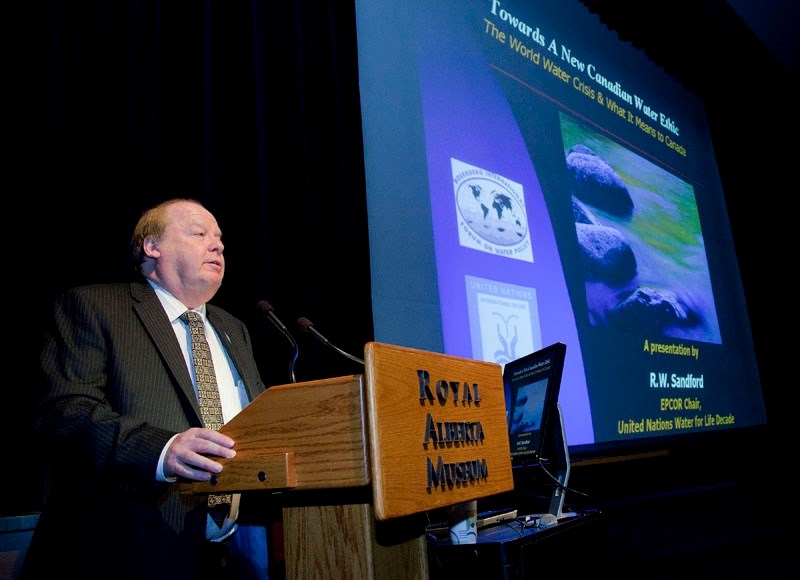Farms will soon become the greatest single threat to Canada's water supply, predicts a national water expert, but could also become its greatest champion.
Renowned author Robert Sandford spoke Thursday night to about 50 people at the Royal Alberta Museum about water as part of Canada Water Week. Sandford is the Epcor chair of the Canadian Partnership Initiative for the UN Water for Life Decade and has written numerous books on the world water crisis.
Canada's water supply is showing signs of trouble everywhere, Sandford said. About 300 glaciers have vanished from the Rocky Mountains since the 1920s, half of which disappeared after 1985. "Our losses appear to be accelerating."
Algal blooms on Lake Winnipeg, fed by urban and agricultural runoff, are now three times the size of Alberta's oilsands operations. "Over the next five years, agricultural practices are going to be identified in Canada as the country's foremost threat to water quality and public health."
Canadians will need to change how they relate to water in order to address these threats, Sandford says. "Unless we want to contribute to our own and our global ecosystem decline, our relationship to water has to become a relationship with water."
A problem of growth
People today generally see water as a resource to be used, Sandford said. If water flows by a city untouched, we call it "wasted," even though that water is being used to support ecosystems.
That's encouraged wasteful behaviour and overexploitation. B.C. salmon farms are now draining inland lakes to support spawning grounds near the coast, for example. Upgraders in the industrial heartland region could potentially draw 10 times more water from the North Saskatchewan than the city of Edmonton.
Development and population growth have made these practices untenable. There will be about 9.5 billion people on Earth by 2050, Sandford said, many of which will live in water-scarce nations.
The world will need about 5,200 more cubic kilometres of water a year to feed those people, Sandford says — equivalent to every drop of freshwater on the surface of the Earth. That will put our waters under tremendous stress.
Meanwhile, our water sources are shrinking. Alberta's Colombia Icefield appears to have lost a third of its volume since the 1990s, Sandford says, with the Saskatchewan glacier (which feeds the North Saskatchewan River) also showing losses. Climate warming is accelerating these trends.
Water ethics
Sandford called for a new partnership with water, one that, at its base, acknowledges the right of all species to have enough water to survive. "Treat water as you would power," he urged, and save it whenever possible.
Canadians will have to value water and the services that provide it, Sandford says. Wetlands upstream of Winnipeg provide about $400 million in flood control a year, a service not accounted for when we destroy them. "If we're going to continue to decimate natural systems, we're going to have to artificially duplicate [them]," he notes.
Farmers will be on the front lines when it comes to protecting our water, Sandford says, using top-of-the-line practices to reduce pollution and use. He pictured a future where farmers would be paid to restore wetlands or to plant crops able to filter water and store carbon by other residents, practices already in place in Israel's Hula Valley.
Canada is not a leader when it comes to water conservation, Sandford says, but it could become one. "Unlike so many other place in the world, Canada still has room to move."
Canada could become a hydrological superpower, he says, but only if it shows the world how to better use its water. "Then we really will be leaders."




